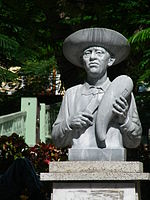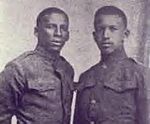- Rafael Hernández Marín
-
Rafael Hernández
A bust of Rafael Hernández Marín in San Juan, Puerto RicoBorn October 24, 1892
Aguadilla, Puerto RicoDied December 11, 1965 (aged 73)
San Juan, Puerto RicoNationality Puerto Rican Occupation Composer
1."Lamento Borincano"
2."Preciosa"Notes During World War I Hernández served in the "The Harlem Hell Fighters"Rafael Hernández (October 24, 1892 – December 11, 1965), was one of the most important composers of Puerto Rican popular music during the 20th century.[1]
Contents
Early years
Hernández (birth name: Rafael Hernández Marín[note 1]) was born in the town of Aguadilla, Puerto Rico, into a poor family. As a child, he learned the craft of cigar making, from which he made a modest living. He also grew to love music and asked his parents to permit him to become a full-time music student. When he was 12 years old, Hernández studied music in San Juan, under the guidance of music professors Jose Ruellan Lequenica and Jesús Figueroa. He learned to play many musical instruments, among them the clarinet, tuba, violin, piano and guitar. However, according to many Puerto Rican music historians, it was when he learned how to write music that his life and the history of Puerto Rican music would change forever.[2] At the age of 14, he played for the Cocolia Orquestra. Hernández moved to San Juan where he played for the municipal orchestra under the director Manuel Tizol.
World War I and the Orchestra Europe
Rafael Hernández (left) with brother Jesus, c.1917 during World War I
In 1917, Hernández was working as a musician in North Carolina, when the U.S. entered World War I. The Jazz bandleader James Reese Europe recruited brothers Rafael and Jesús Hernández, and 16 more Puerto Ricans to join the United States Army's Harlem Hell fighters musical band, the Orchestra Europe. He enlisted and was assigned to the U.S. 369th Infantry Regiment (formerly known as the 15th Infantry Regiment, New York National Guard, created in New York City June 2, 1913). The regiment, nicknamed "The Harlem Hell Fighters" by the Germans, served in France. Hernandez toured Europe with the Orchestra Europe. The 369th was awarded French Croix de Guerre for battlefield gallantry by the President of France.[3]
Hernandez and Pedro Flores
After the war, Hernández moved to New York City. In the 1920s, he started writing songs and organized a trio called "Trio Borincano". In 1926, fellow Puerto Rican Pedro Flores joined the Trio. Even though Hernández and Flores became and always remained good friends, they soon went their separate ways and artistically competed against each other. After the trio broke up, he formed a quartet called "Cuarteto Victoria" which included singer Myrta Silva, also known as La Guarachera and La Gorda de Oro. With both groups, Hernández traveled and played his music all over the United States and Latin America.[4] On September 2, 1927, Hernández' sister Victoria opens what is probably the first Puerto Rican-owned music store, which also acts as a booking agency and base of operations for her brother.[3] In 1929, Trío Borinquen recorded Linda Quisqueya (originally titled Linda Borinquen) and that same year he founded the "Cuarteto Victoria" (also known as "El Cuarteto Rico") named after his sister.[3]
In 1932, Hernández moved to Mexico, where the Mexicans treated him as one of their own. There, he directed an orchestra and enrolled in Mexico's National Music Conservatory to further enrich his musical knowledge. Hernández also became an actor and organized many of the musical scores in Mexico's "golden age" of movies. The Mexicans of the state of Puebla consider his composition "Qué Chula es Puebla" to be their unofficial anthem. His wife (and eventual widow) was Mexican.[5]
"Lamento borincano" and "Preciosa"
 External audio
External audio
You may listen to Luciano Quiñones piano interpretation of Hernandez' "Lamento Borincano" here 
and to his interpretation of "Preciosa" here In 1937, Hernández wrote one of his greatest works, "Lamento borincano". That same year, he also wrote what is considered by many to be his masterpiece, "Preciosa". In 1947, Hernández returned to Puerto Rico and became the director of the Puerto Rico Symphony Orchestra. He was also a musical advisor to the government-owned WIPR Radio.[4]
Hernandez's talent went beyond composing only patriotic music. He also composed Christmas music, Danzas, Zarzuelas, Guarachas, Lullabies, Boleros, Waltzes and more. Many people in the Dominican Republic consider his composition "Linda Quisqueya" their second national anthem.[4]
Hernández's works' include "Ahora seremos felices" (Now We Will Be Happy), "Campanitas de cristal" (Crystal Bells), "Capullito de Alhelí", "Culpable" (Guilty),"El Cumbanchero"[6] (also known as "Rockfort Rock" or "Comanchero" (sic) to reggae aficionados), "Ese soy yo" (That's Me), "Perfume de Gardenias" (Gardenia Perfume), "Silencio" (Silence), and "Tú no comprendes" (You Don't Understand), among 3,000 others. His music became an important part of the Puerto Rican Culture.[5]
Later years
Hernández was Honorary President of the Authors and Composers Association. He was also the founder of little league baseball in Puerto Rico. President John F. Kennedy christened him "Mr. Cumbanchero".[2]
Hernández died in San Juan on December 11, 1965, shortly after Banco Popular de Puerto Rico produced a TV special in his honor in which he addressed the people for the last time. The special was simulcast on all TV and most island radio stations. The TV special was rebroadcast on May 13, 2007. Rafael Hernández's remains are buried in the Santa Maria Magdalena de Pazzis Cemetery of Old San Juan.
Legacy
Puerto Rico has honored his memory by naming public buildings, avenues and schools after him. The airport in Aguadilla is named Rafael Hernández Airport. There are schools in Bronx, N.Y., Boston, Mass., and in Newark, N.J. named after Rafael Hernández. Renowned Puerto Rican Sculptor Tomas Batista created a statue of Hernández which is in the municipality of Bayamon, Puerto Rico. The Interamerican University of Puerto Rico, the repository of his works, operates a small museum in his honor at its Metropolitan Campus in San Juan which is directed by his son, Chalí Hernández.
The impact of Hernandez's songs among Puerto Ricans was felt when Puerto Rican singer Marc Anthony recorded Hernández's "Preciosa" and sang said song in a 2005 concert in New York City's Madison Square Garden. According to an article in the New York Times:
"Mr. Anthony did his version of Preciosa. It may have been the night's most popular love song, precisely because it's not about a woman: it's about a whole island, instead."[7]
Military decorations and awards
Among Hernández's military decorations are the following:
See also
- African immigration to Puerto Rico
- List of famous Puerto Ricans
- Puerto Ricans in World War I
- Puerto Rican Songwriters
Notes
- ^
This name uses Spanish naming customs; the first or paternal family name is Hernández and the second or maternal family name is Marín.
References
- ^ Music of Puerto Rico
- ^ a b Rafael hernandez Puerto Rico's Soul
- ^ a b c - The Great Slsa Timeline
- ^ a b c Hernandez Marin, Rafael
- ^ a b History of Puerto Rico
- ^ Berenguer González, Ramón T. "El Cumbanchero" Salsa Mp3· ISWC T-0425394622 Published with the permission of the owner of the version
- ^ New York Times; Latin Singers who Offer 3 Varieties of Heartthrob; by Klefa Sanneh; Published September 12, 2005
External links
Categories:- 1892 births
- 1965 deaths
- Puerto Rican people of African descent
- Puerto Rican musicians
- Puerto Rican composers
- Puerto Rican Army personnel
- Puerto Rican military personnel
- American military personnel of World War I
- United States Army soldiers
- People from Aguadilla, Puerto Rico
Wikimedia Foundation. 2010.


